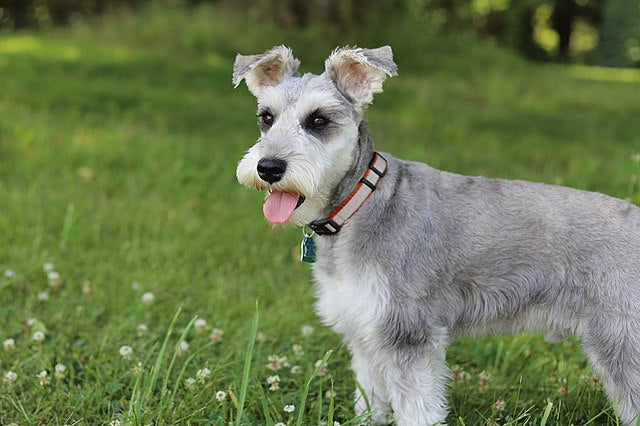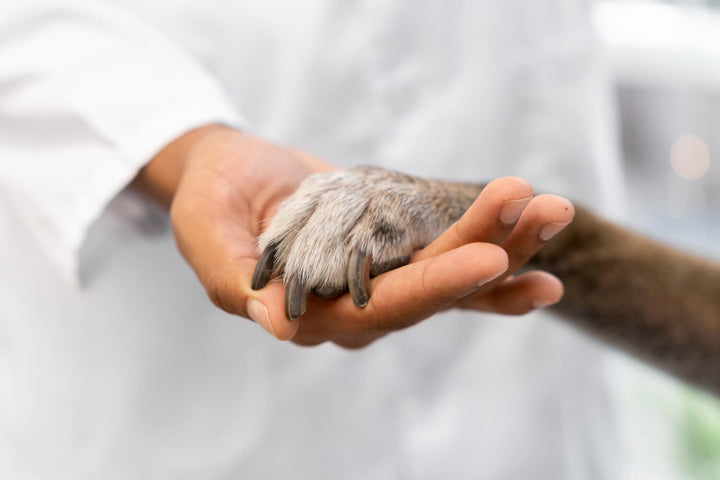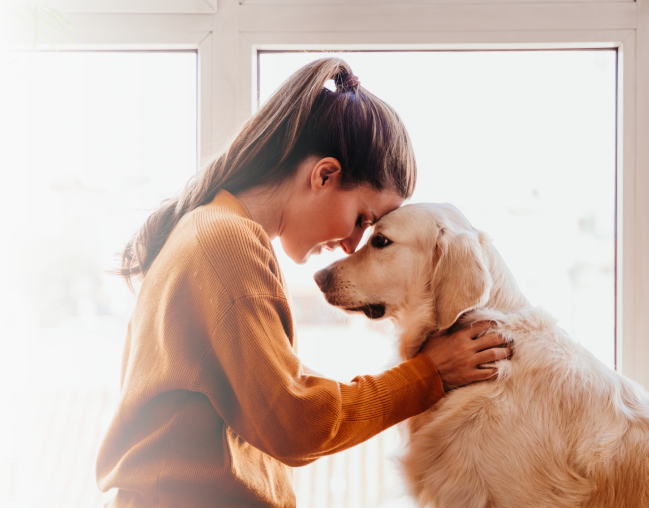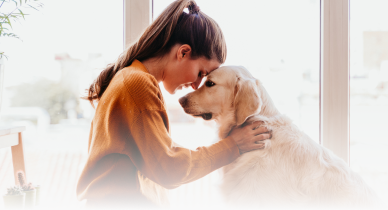If you're in search of a small dog with a larger-than-life personality, look no further than the Miniature Schnauzer. This breed is a delightful combination of spunk, intelligence, and charm, making it a beloved companion for families and individuals alike. With its distinctive beard and eyebrows, the Miniature Schnauzer is not just known for its looks, but also for its unwavering loyalty and affection. This breed's vibrant spirit and adaptability have earned it a special place in the hearts of dog lovers worldwide.
Did You Know these Facts about the Miniature Schnauzer?
-
The Miniature Schnauzer hails from Germany and is a descendant of its larger cousin, the Standard Schnauzer. They were initially bred for ratting and guarding farms due to their small size and fearless nature.
-
One of the most distinguishing features of the Miniature Schnauzer is its iconic beard and bushy eyebrows. These facial furnishings aren't just for show; they serve a purpose by protecting the dog's eyes from dirt and debris.
-
Miniature Schnauzers aren't just charming; they're also highly trainable. They excel in various canine activities, including obedience, agility, and even therapy work.
-
If you're concerned about allergies or excessive shedding, the Miniature Schnauzer is an excellent choice. Their wiry coat is considered hypoallergenic, making them a suitable pet for many allergy sufferers.
- Celebrity Status: This breed has found its way into popular culture. One famous Miniature Schnauzer is Spike, who played the role of "Fufu" in the animated movie "The Lady and the Tramp."
The Miniature Schnauzer holds a strong presence in the canine world. According to the American Kennel Club (AKC), it consistently ranks among the top 20 most popular breeds in the United States. In fact, in 2022, they reached the #17 spot in the AKC's popularity list. Their charm, adaptability, and manageable size make them a favorite choice for families, singles, and seniors alike.

Traits of the Miniature Schnauzer Breed
Personality. Miniature Schnauzers are renowned for their lively and friendly personalities. They're known to be affectionate with their families, making them great companions. Despite their small size, they often consider themselves to be much larger, displaying a confident and courageous demeanor. This breed is also highly intelligent, which can sometimes lead to a bit of stubbornness, but it also makes them quick learners.
Family Life. Miniature Schnauzers thrive in family settings. They're good with children and tend to be protective without being overly aggressive. However, proper socialization from an early age is essential to ensure they get along well with other pets.
Appearance. These small dogs typically weigh between 11 to 20 pounds (5 to 9 kg) and stand around 12 to 14 inches (30 to 36 cm) at the shoulder. They come in various coat colors, including salt and pepper, black and silver, and solid black. Their wiry double coat is resistant to weather and lends them that distinctive, dignified appearance.
Sociability. Miniature Schnauzers are social butterflies. They thrive on human interaction and can become quite attached to their owners. This breed enjoys being part of family activities and might suffer from separation anxiety if left alone for extended periods.
Average Sizes & Life Expectancy
- Height: 12 to 14 inches tall (30 to 36 cm)
- Weight: 11 to 20 pounds (5 to 9 kg)
- Life Expectancy: Around 12 to 15 years
Detailed Description of the Miniature Schnauzer Breed
Appearance. Standing proudly at 12 to 14 inches (30 to 36 cm) and weighing between 11 to 20 pounds (5 to 9 kg), Miniature Schnauzers are a compact breed with a sturdy build. Their square-shaped head boasts an unmistakable beard and expressive eyebrows, giving them an almost human-like countenance. These distinctive facial features are not just aesthetic; they serve to protect the dog's eyes from dirt and debris, especially when digging or exploring.
Their eyes are dark and alert, their ears are set high and stand erect, and their tail is typically docked to a short length. The Miniature Schnauzer's coat is wiry and dense, coming in various color options, including salt and pepper, black and silver, and solid black. This unique coat is not just for show; it's weather-resistant, making these dogs suitable for a range of climates.
Temperament and Personality. Miniature Schnauzers are often described as extroverted and charming. They're known for their confidence, curiosity, and friendly disposition. While they are generally good with children and make excellent family dogs, early socialization is vital to ensure they get along well with other pets. This breed's lively spirit is matched by their affection for their human companions, and they often seek to be a part of family activities.
These dogs have keen instincts, making them excellent watchdogs. They'll alert their owners to any potential intruders with their loud, distinctive bark. These dogs are highly intelligent and quick learners. This trait makes them relatively easy to train, but it can also lead to some stubbornness if not handled properly. Consistent, positive reinforcement-based training is recommended for the best results. Miniature Schnauzers have a playful side and enjoy engaging in interactive games and activities. They are known for their spirited nature and love for playtime.
Adaptability. The adaptability of Miniature Schnauzers is one of their standout traits. Whether you live in a spacious house with a yard or a compact apartment, these dogs can thrive in various living environments. Their small size makes them suitable for urban living, provided they receive sufficient exercise and mental stimulation. They can adapt to different climates but might need a sweater in colder weather due to their short, wiry coat.
Care Guidelines. Regular grooming is necessary to maintain the Miniature Schnauzer's distinctive coat. Their coat should be brushed weekly to prevent matting, and professional grooming is recommended every 6 to 8 weeks. Regular cleaning of their beard and eyebrows after meals is essential.
These dogs require daily exercise to stay physically and mentally healthy. Engage them in playtime, walks, and interactive games to keep them happy. Feed your Miniature Schnauzer a balanced diet that meets their specific nutritional needs. Consult with your veterinarian for recommendations on portion sizes and food choices.
Regular veterinary check-ups are crucial to monitor your dog's health. Miniature Schnauzers are prone to certain health issues, including hip dysplasia, eye problems, and pancreatitis.
Training Strategies. Miniature Schnauzers respond best to positive reinforcement training methods. Use treats, praise, and rewards to motivate and encourage good behavior. Early socialization is vital to ensure your Miniature Schnauzer is well-adjusted and gets along with other dogs and people.
Be consistent in your training efforts, and establish clear boundaries and expectations from a young age.
Notable in History and Pop Culture. The Miniature Schnauzer has a rich history, originating in Germany. They were initially bred for ratting on farms due to their small size and fearless nature. Over time, they transitioned into beloved family pets. In pop culture, Miniature Schnauzers have made their mark. One famous Miniature Schnauzer is Spike, who played the role of "Fufu" in the animated movie "The Lady and the Tramp." Their distinctive appearance and engaging personality have earned them a place in the hearts of many.
The Miniature Schnauzer is a remarkable breed with a distinctive appearance and an even more exceptional personality. Their loyalty, adaptability, and affectionate nature make them wonderful companions for a wide range of individuals and families. With proper care, training, and socialization, a Miniature Schnauzer can be a cherished member of your household for many years, adding joy and vibrancy to your life.
What to expect when living with the Miniature Schnauzer Breed
Personality. Miniature Schnauzers are known for their big personalities. They are confident, alert, and often exhibit a fearless attitude, which can make them excellent watchdogs. However, underneath their bold exterior lies a heart full of love and devotion for their families. They thrive on human companionship and are known to be affectionate and loyal.
Ideal Environment. Miniature Schnauzers thrive in environments where they can be a part of the family. They love being around people and are excellent with children. Their adaptable nature means they can live in various settings, from apartments to houses with yards. However, they do need daily exercise and mental stimulation to keep their active minds and bodies happy.
Maintenance Level. Miniature Schnauzers have a moderate level of maintenance. One of their most iconic features, their wiry double coat, requires regular grooming to prevent matting. Many owners opt for professional grooming to maintain the classic Schnauzer look. Additionally, their beard and eyebrows often need cleaning after meals to avoid staining.
Overall Health Expectations and Best Health Tests for the Miniature Schnauzer Breed
Health Considerations. Miniature Schnauzers are generally healthy dogs, but like all breeds, they can be prone to certain health issues. Here are some common health concerns and recommended health tests:
1. Hypothyroidism - Miniature Schnauzers can be prone to hypothyroidism, a condition where the thyroid gland doesn't produce enough hormones. Blood tests can diagnose this condition.
2. Pancreatitis - This breed is susceptible to pancreatitis, an inflammation of the pancreas. Feeding them a low-fat diet and avoiding high-fat treats can help prevent this condition.
3. Eye Conditions - Miniature Schnauzers may develop eye conditions like cataracts and retinal problems. Regular eye exams by a veterinary ophthalmologist are essential.
4. Bladder Stones - Some Miniature Schnauzers are prone to bladder stones. A urinalysis and imaging can diagnose this condition, and dietary changes may be necessary.
5. Heart Disease - Mitral valve disease is relatively common in older Miniature Schnauzers. Regular veterinary check-ups can help monitor heart health.
Recommended Health Tests. Responsible breeding involves health screening for these conditions.
Best Nutrition, Diet & Supplements for the Miniature Schnauzer Breed
Nutrition and Diet. Miniature Schnauzers typically require about 1/2 to 1 cup of high-quality dog food per day, divided into two meals. The exact amount can vary based on factors like age, metabolism, and activity level. It's advisable to consult your veterinarian for personalized feeding guidelines.
Look for dog food that lists a quality source of animal protein as the primary ingredient. Protein is essential for muscle development and overall health. A moderate level of fat in their diet helps maintain their coat and provides a source of energy.
However, be cautious not to overfeed, as Miniature Schnauzers can be prone to weight gain. Complex carbohydrates like brown rice and sweet potatoes are good choices. They provide energy and essential nutrients. Including small amounts of fruits and vegetables in their diet can provide vitamins, minerals, and antioxidants.
Hydration is Key. Adequate hydration is essential for Schnauzers. Encourage your dog to drink plenty of water.
Supplements. Your veterinarian may recommend supplements like glucosamine and chondroitin to support joint health, especially as they age.
Foods to Avoid. Miniature Schnauzers can be prone to pancreatitis, so it's essential to avoid feeding them fatty or greasy foods, including many human snacks.
Grooming Requirements for the Miniature Schnauzer Breed
Coat Maintenance and Shedding. Their wiry outer coat and soft undercoat should be brushed at least once a week to prevent matting and remove loose hair. Professional grooming is recommended every 6 to 8 weeks to maintain their characteristic appearance. Their beard and eyebrows require daily cleaning after meals to prevent staining and keep them tidy. Regular trimming is essential to maintain their distinctive "Schnauzer cut." This includes trimming the body, legs, and face.
Paw Care and Hygiene. Trim their nails as needed, typically every few weeks, to prevent overgrowth and discomfort.
Ear Care. Clean their ears regularly and check for signs of infection, such as redness, discharge, or odor.
Bathing Frequency. Bathe your Miniature Schnauzer every 4 to 6 weeks or as needed. Use a dog-specific shampoo and conditioner to maintain their coat's texture.
Exercise Required for the Miniature Schnauzer Breed
Engage in interactive play sessions, such as fetch or tug-of-war, to keep them mentally and physically stimulated.
Daily walks are essential. Aim for at least 30 minutes to an hour of exercise per day. Incorporate training sessions into their exercise routine. Mental stimulation is just as important as physical activity for this intelligent breed.
Allow them to interact with other dogs and people to ensure they develop into well-rounded pets.
Training Tips for the Miniature Schnauzer Breed
Training a Miniature Schnauzer can be a rewarding experience, but it's important to use effective methods.
Do…
- Use positive reinforcement techniques like treats and praise to reward good behavior.
- Be patient and consistent in your training efforts.
- Begin socialization and training at a young age to ensure they grow up well-adjusted.
-
Enroll in obedience classes to help them develop essential skills.
Don't…
- Use harsh training methods or punishment.
- Skip Socialization. Neglecting socialization can result in shyness or fearfulness.
- Skip Obedience Training. Basic obedience training is essential for safety and proper behavior. Don't skip this crucial step.
The Miniature Schnauzer Breed is Suitable For
Miniature Schnauzers are well-suited for apartment living as long as they receive daily exercise. Their small size makes them comfortable in smaller spaces.
While they do well in apartments, they also enjoy having access to a secure yard where they can run and play. A fenced yard is ideal for them.
Miniature Schnauzers are excellent family pets. They are known for their affection and are generally good with children. However, it's essential to supervise interactions between dogs and young children to prevent any accidental rough play.
They make great companions for singles and seniors due to their manageable size, loyalty, and adaptability. Miniature Schnauzers usually get along well with other pets, especially if they are socialized from a young age. They might have a strong prey drive, so introductions to smaller animals should be supervised.
The Miniature Schnauzer Breed is Not Suitable For
If you cannot commit to providing them with the necessary exercise and mental stimulation, a Miniature Schnauzer may not be the right choice. They thrive on activity and can become bored and restless without it.
If you work exceptionally long hours and cannot provide companionship or breaks for your dog, this breed may not be the best choice, as they enjoy human interaction.
Famous Miniature Schnauzer Owners
-
Mary Tyler Moore - The iconic actress and television personality owned a Miniature Schnauzer named "Muffy." Muffy became a recognizable companion on "The Mary Tyler Moore Show."
-
Dakota Fanning - The talented actress, known for her roles in movies like "I Am Sam" and "War of the Worlds," owns a Miniature Schnauzer named "Lewellen."
- Mickey Rourke - The actor and former boxer has a Miniature Schnauzer named "Loki." Loki even made appearances on red carpets alongside Rourke.
Accomplishments of the Miniature Schnauzer Breed
Miniature Schnauzers have made their mark in various fields and have achieved recognition for their qualities.
Many Miniature Schnauzers serve as therapy dogs, bringing comfort and joy to patients in hospitals and nursing homes. Their intelligence and keen sense of smell make them valuable in search and rescue operations.
Miniature Schnauzers have appeared in popular culture, with notable appearances in movies like "The Adventures of Tintin" and as the beloved pet of Captain von Trapp in "The Sound of Music."
They often participate and excel in dog sports such as agility, obedience, and even dog shows.
These accomplishments showcase the Miniature Schnauzer's versatility and their ability to make a positive impact in various aspects of our lives.

The History of the Miniature Schnauzer Breed
Creation and Purpose. The Miniature Schnauzer is a product of selective breeding in the late 19th century. German dog enthusiasts, primarily in the regions of Württemberg and Bavaria, sought to create a smaller version of the Standard Schnauzer, which was primarily used as a versatile farm dog and rat-catcher.
The exact breeds used to create the Miniature Schnauzer are not well-documented, but it's believed that small Standard Schnauzers were crossed with Affenpinschers and Miniature Poodles. The goal was to retain the Standard Schnauzer's distinctive appearance and working abilities while reducing its size to make it more suitable for smaller farms and households.
Early Roles and Evolution. Like their larger counterparts, Miniature Schnauzers were exceptional at hunting and eradicating rats and other vermin on farms. Their alertness, courage, and protective instincts made them excellent guard dogs. They would alert their owners to the presence of strangers or potential threats.
Even in their early days, Miniature Schnauzers were appreciated for their companionship. Their lively and affectionate nature endeared them to families.
Over the years, the Miniature Schnauzer underwent refinements in both appearance and temperament. Breeders worked diligently to establish consistent standards, ensuring that the breed maintained its distinctive features and qualities.
Changes and Modern Impact. The Miniature Schnauzer was officially recognized by the American Kennel Club (AKC) in 1926. This recognition boosted their popularity in the United States. As society shifted away from agricultural lifestyles, Miniature Schnauzers became primarily companion animals. Their lively and friendly personalities made them cherished family pets.
The breed's iconic appearance with bushy eyebrows, a bristly beard, and wiry coat texture has remained largely unchanged. Their distinctive salt-and-pepper or solid black or white coat colors continue to be a hallmark of the breed. While no longer farm dogs, Miniature Schnauzers retain their intelligence and working instincts. They excel in various dog sports and activities, including obedience, agility, and therapy work.
Today, the Miniature Schnauzer is celebrated worldwide as a charismatic, adaptable, and affectionate companion. They continue to thrive in various roles, from cherished family pets to therapy dogs, and their enduring popularity is a testament to their enduring charm.
The Miniature Schnauzer Breed Standard
The Miniature Schnauzer belongs to the Terrier Group according to the American Kennel Club (AKC). This group consists of breeds known for their energetic, feisty, and often mischievous nature.
The formal breed standard for the Miniature Schnauzer, as recognized by the AKC, is a detailed description of the ideal dog of this breed. It serves as a guideline against which dogs are judged at shows.
The American Miniature Schnauzer Club (AMSC) is the national breed club for Miniature Schnauzers. You can find more information about the breed, including breeder referrals and events, on their website: AMSC Official Website.
General Appearance
Head, Muzzle, Nose. The Miniature Schnauzer's head is a distinctive feature. It is rectangular in shape, with a strong, arched forehead that extends into bushy eyebrows. These expressive eyebrows give them a unique and alert expression. The head is proportionate to the body, neither too small nor too large. The muzzle of the Miniature Schnauzer is strong and squared-off, blending smoothly into the head. They have a well-defined black nose that complements the color of their coat. In salt and pepper or black and silver Schnauzers, the nose is black, while in solid black Schnauzers, a black nose is preferred.
Teeth. Miniature Schnauzers have a strong and well-aligned set of teeth that meet in a scissors bite. Their dental health is vital, and regular dental care should be a part of their grooming routine.
Neck. The neck of a Miniature Schnauzer is moderately long, strong, and gracefully arched. It flows smoothly into well-laid-back shoulders, giving them an elegant appearance.
Body. The body of a Miniature Schnauzer is compact and sturdy, with a deep chest and well-sprung ribs. They have a level back, and their topline remains straight from the withers to the tail. Their short, strong loins contribute to their overall balance.
Tail. Traditionally, Miniature Schnauzers have their tails docked in the United States, leaving a short, straight tail. However, in countries where docking is prohibited, their tails remain natural and are carried erect. The tail complements the overall balance of the dog.
Coat. Miniature Schnauzers boast a double coat. The outer coat is wiry, dense, and hard, providing protection from the elements and giving them their iconic scruffy appearance. Their undercoat is soft and insulating. Accepted coat colors are salt and pepper, black and silver, and solid black. The salt and pepper coat typically features a combination of white, black, and gray hairs, giving them a distinctive, peppered appearance.
Size. The breed's size is in its name: "Miniature." Males typically stand between 12 to 14 inches (30 to 36 cm) at the shoulder, while females are slightly smaller, measuring 11 to 13 inches (28 to 33 cm).
Gait. Miniature Schnauzers move with a brisk and alert gait. Their legs move in a straight line, reflecting their balanced structure. They exhibit a free, ground-covering stride, with their hocks driving smoothly. When viewed from the front or rear, their legs move parallel to each other, emphasizing their overall soundness and agility.
Reputable Breeders
For those seeking a well-bred Miniature Schnauzer, there are reputable breeders who prioritize health, temperament, and the breed's standard. Here are a few notable breeders:
Top Shelters for Adoption
Adopting a dog can be a rewarding experience. Here are a few shelters where you might find a Schnauzer in need of a loving home:
Top 5 Frequently Asked Questions & Answers about the Miniature Schnauzer Breed
What is the Miniature Schnauzer's average lifespan?
The Miniature Schnauzer has an average lifespan of 12 to 15 years.
Are Miniature Schnauzers good with children?
Yes, they are known for their friendly and tolerant nature, making them excellent family pets.
Do Miniature Schnauzers shed?
No, they are considered a low-shedding breed, which makes them suitable for people with allergies.
Are they easy to train?
Yes, Miniature Schnauzers are intelligent and trainable, but they can be a bit stubborn at times. Consistent, positive reinforcement training works best.
Do they get along with other pets?
With proper socialization, Miniature Schnauzers can coexist peacefully with other pets, including dogs and cats.
A Final Tip for Bringing a Miniature Schnauzer into Your Life
The Miniature Schnauzer is a delightful companion that brings boundless energy, loyalty, and affection to any home. Their lively spirit, distinctive appearance, and adaptability make them a wonderful addition to families, singles, and seniors alike. However, remember that they thrive on social interaction and mental stimulation, so be prepared to provide them with love, exercise, and mental challenges. In return, you'll gain a loyal and loving furry friend for life.
Valuable Resources for Your Journey to Parenting a Miniature Schnauzer
At Felicitails you will find many wonderful services, supplies and guides for your life ahead with a loving pup at your side.
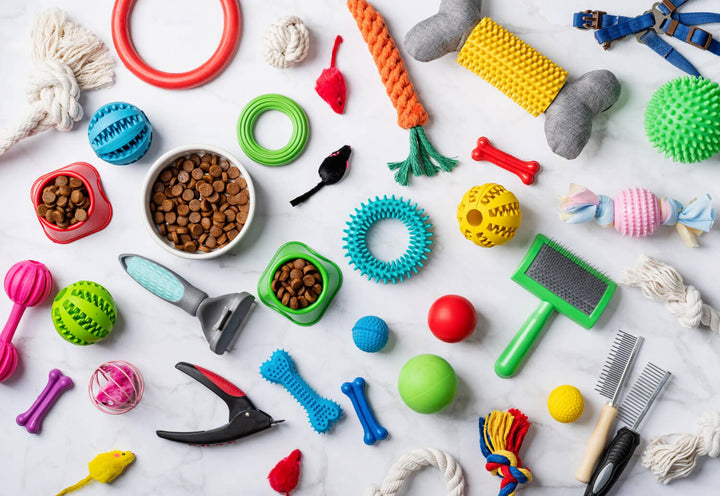
Hope You Enjoyed The Read!
Tag Cloud

A warm welcome from Lindsay & Huck (my English Pointer). Hope you enjoy the read and find just what you are looking for when it comes to living your best life with your loved pets.

-
Dog Breeds
(42)
-
Emotional Support Animals
(10)
-
Dog Grooming
(6)
-
Dog Health
(18)
-
Life with a Dog
(18)
-
Dog Nutrition
(11)
-
Service Animals
(11)
-
Dog Training
(5)

